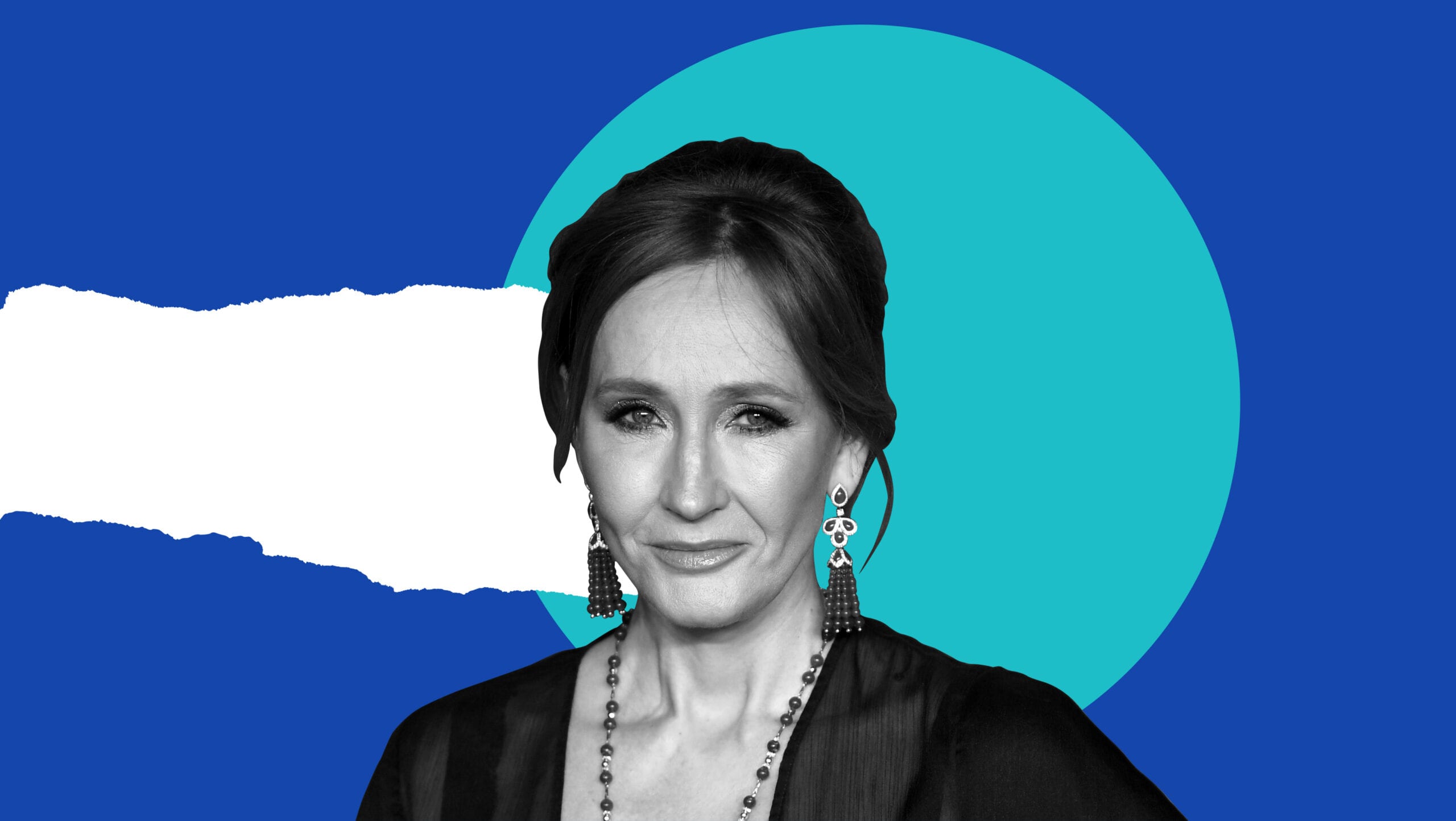Now is a time both terrifying and exhilarating. A time of pandemic and global economic crisis. A time of revealing and exposing acts of police brutality and systemic racism. A time when masses of people are taking to the streets to support Black Lives Matter and the movement for police abolition in numbers never seen before. And, somehow, it’s at this time that J.K. Rowling, the author of the best-selling book series of all time, has decided to use her platform to… go mask-off as a trans-exclusionary radical feminist (TERF).
Last week, Rowling took to Twitter in outrage that an article discussing period poverty during the COVID-19 pandemic referred to those with periods as “people who menstruate.” “I’m sure there used to be a word for those people,” she mused to her more than 14 million followers. “Someone help me out. Wumben? Wimpund? Woomud?”
After she was called out for transphobia, Rowling doubled down, tweeting another thread and later penning a sprawling 3,900-word essay on her website centred on her fears and misconceptions of trans people.
It’s not the first time Rowling has gone down this path, either: Last year, she supported Maya Forstater, a British woman who lost her job for questioning the legitimacy of trans women’s identities on Twitter. (The decision to terminate her job was upheld by an employment tribunal in December.) And before that, she was caught liking transphobic tweets and writing questionable scenes featuring trans women under her pen name (which, coincidently, happens to be the name of a famous conversion therapist).
Here’s what we know to be true about Rowling: The contents of her posts are clueless, unfactual recitations of TERF talking points. Though she claims otherwise, she seems to have zero engagement with actual trans life, writing or thought—beyond, it appears, the people yelling at her on Twitter. (Here’s one stab at a rundown of her fallacies.) Choice examples of her anti-trans sentiments include: repeating the canard that protecting trans people is an invitation for predatory cis men to attack women (even though this has not happened where the laws which Rowling disparages exist), hand-wringing over trans kids as if hordes of children are being forced into sex changes (they are not), invoking “biological sex” in place of “cis women” (a common sleight-of-hand as if trans people inhabit neither biology nor sex) and the classic invocation of “trans activists” as a shadow monolithic cabal waiting to cancel everybody it deems insufficient. (As many have joked for years: Where does this cabal meet? Where can I sign up?)
In addition, she has expressed views that are ableist towards autistic people, citing research indicating that autistic transmasculine children are overrepresented among trans kids. Rowling implies that autistic people are more suggestible and easily manipulated, and that they are not actually trans but rather confused about their gender identity.
“Rowling’s influence is too big, and the stakes of her views too large, to treat her like the annoying troll in your mentions”
And further reasons abound to take issue with the author of the Harry Potter series, particularly the racist stereotypes that riddle her books—such as the anti-Semitic imagery of the banking goblins and the lazy naming of the one Asian character Cho Chang.
But while famous people rave about stupid shit all the time and it is practical to ignore them, Rowling’s formative role in the lives of so many children and young adults—and her darling status in mass media—is massive enough (helluva headline Variety) to make that calculus more complicated. Indeed, Rowling’s insistence on the rigidity of “biological sex” mirrors the argument that President Donald Trump’s administration used just last week to remove federal anti-discrimination LGBTQ2 protections, and that fuelled U.K. Prime Minister Boris Johnson’s decision to drop pre-existing plans for legal gender changes without medical intervention. Rowling’s influence is too big, and the stakes of her views too large, to treat her like the annoying troll in your mentions. Letting her be isn’t an option.
Early in her essay, Rowling writes that before she threw her aforementioned support to Forstater last year, she steadied herself: “I must have been on my fourth or fifth cancellation by then.”
It’s meant as a throwaway line, a pithy allusion to insatiable cancel-hungry masses. You could delete the sentence wholesale and the paragraph in which it’s written would function as intended. But she’s inadvertently revealing weaknesses in this whole debate on problematic artists—of how to talk or not talk about their work, of the whole concept of cancelling people at all. Can you really cancel people multiple times over? (The “fourth or fifth” bit is especially revealing—the implication being that her cancellations happen so often, who could possibly keep track?)
But let’s say you take her at face value. If you can be cancelled several times over while retaining 14 million-plus Twitter followers, in addition to prolific perches atop Amazon bestseller markets for books written more than a decade ago and spawning an enduring, global, billion-dollar entertainment franchise that includes movies, video games, websites, toys and amusement parks, then what does being cancelled even mean?
Maybe getting legitimately cancelled—like wholesale shut out from society—is actually very hard for someone as powerful and wealthy as Rowling. Perhaps she proves your odds of getting “cancelled” are inversely proportional to the amount of power and cachet you actually hold. The social media mob can cause cruel harm, sure, but it’s usually those without accolades and resources and publication credentials who tend to actually suffer.
Trans readers who loved Harry Potter are numerous and pretty peeved with Rowling—as they should be. But here’s something I believe: Once a book is released, the author becomes just one of many parties with a view to the meaning of its characters and world. A salient party, certainly, and often the one with the loudest voice, but nothing close to an arbiter. Consumption of art being rarely a passive experience, the author isn’t dead; they’re just one of many mortals.
Homages like fanfic and cosplay are immediately visible examples of this dynamic, and perhaps are representative markers of the silent, widespread, internal world-building in which moving works of art can mark and shift a person’s being.
Non-binary writer Aja Romano alluded to this phenomenon last week in an essay on how the genderfluid character of Tonks in Harry Potter and the Order of the Phoenix helped them come out, even as the final book in the series found Tonks as the toned down, binarized feminine Dora:
None of this changes what Tonks means to me. She remains the character who innately reflected my own non-binary nature before I even fully understood it myself. She’s the Tonks I created, not the one Rowling gave me—not the character who ended the books, but the Tonks who began them.
It can be an everyday experience to consume art by artists who don’t (at best) understand our humanity, to fit ourselves into a story where we were likely never considered. I think a lot of queer people know what that’s like. We’ve done it all the time—especially with works from our younger years. Most people from marginalized backgrounds know what it’s like to consume art that takes a shit on you, then make a degree of peace with consuming it anyway, given the options.
For me, this landed particularly hard with musicians when I came out. I’ll always be a bit salty about Lady Gaga’s veneration given what she used to say about trans women, but in the last decade I haven’t taken her off my playlists. Nor have I removed the Smashing Pumpkins’ Mellon Collie and the Infinite Sadness despite Billy Corgan being Billy Corgan. Meanwhile, I can’t bring myself to read poet and lesbian feminist theorist Adrienne Rich, who supported the germinal TERF manifesto The Transsexual Empire. But I know trans women who do, and that’s cool.
“Making sacrifices and calibrations around problematic art isn’t special or interesting, it’s just boringly human”
Making sacrifices and calibrations around problematic art isn’t special or interesting, it’s just boringly human—and any conversation surrounding “cancel culture” that doesn’t take this into account warrants suspicion.
Not that I’d ever, say, write about the Smashing Pumpkins without caveating that Billy Corgan is Billy Corgan. And I don’t mind people loving Adrienne Rich, but I wish they’d at least acknowledge her involvement in The Transsexual Empire while gushing about her. The chasm of obligation is wide between consuming art in private and discussing that art in public. As Romano puts it:
…I think cancel culture is best treated like a collective decision to minimize the cultural influence a person and their work have moving forward. This approach has already been applied to some 20th-century figures whose art is now almost always foregrounded within the context of what remains problematic about it: White supremacists Ezra Pound and H.P. Lovecraft, and the white supremacist film Birth of a Nation, are the clearest, most well-known examples, but society has also recalibrated the way we discuss more recent creators like Woody Allen and Michael Jackson. In all of these controversial cases, the approach usually winds up being one of compromise: No one wants to lose Cthulhu or “Thriller” or Annie Hall, but we also can no longer talk about any of those stories without making it clear that they were created by bigots or predators.
With J.K. Rowling, we’ve reached that point nearly in real time.
A minor jeer I’ve found a bit annoying in this mess: “I never liked those crappy books anyway!” or some variant thereof. What does that matter? Everyone above the age of kindergarten has probably liked some troublesome art they will one day feel weird about. Good for you that you missed out on this round, I guess.
There’s something deeper going on here, though, in this consistently broken expectation that the artists we love won’t one day turn up with a deal-breaking ugliness. Artists are no less capable of disappointing you than your co-worker or the guy who runs your favourite sandwich shop; but even among those more cynical, it’s common to gird against the possibility, to raise the specter in the hopes it won’t happen. “Don’t tell me if [insert artist here] does something fucked up, I couldn’t handle it” is a thing I see on my timeline a lot.
I feel it. It’s a joke, but it’s not a joke. I fall for a book or a song and without realizing it, subconsciously, I want the person who made it to be good. It’s an invisible trick, a stone skipping under the water, a slippery thing to unlearn.
I love Harry Potter. I’m sure I always will. I fell for the Snape/Lily plotline particularly hard at the end. I still have fanart of that saved somewhere.
When I heard about Rowling, I was bummed, knowing anti-trans forces would get a shot of juice out of it given her cultural footprint. But I didn’t feel personally upset or shocked or betrayed. I would have been, no doubt, once upon a time. But knowing that everyone is equally capable of disappointing you is a lesson I’ve been learning for years. I mean that in a liberating, joyous way. It hurts, but it’s also easier to let go. It’s a nice feeling. Later, Rowling.


 Why you can trust Xtra
Why you can trust Xtra


